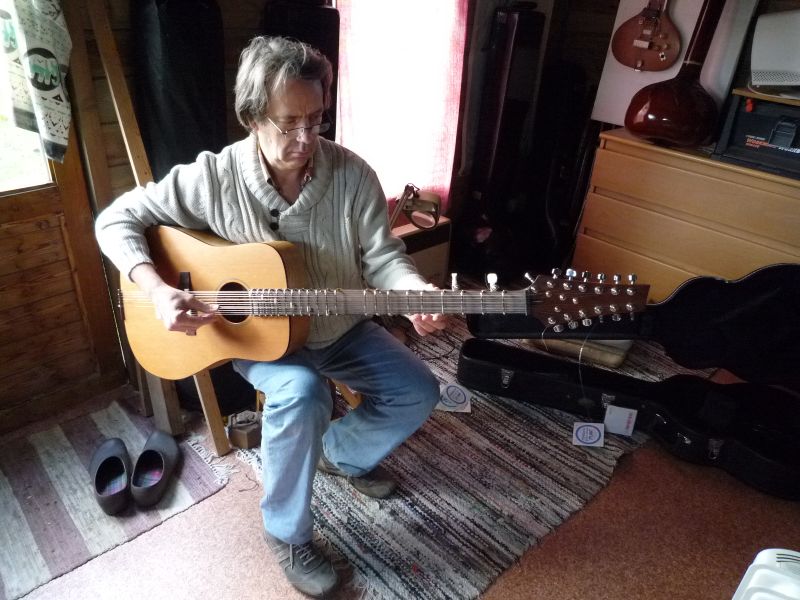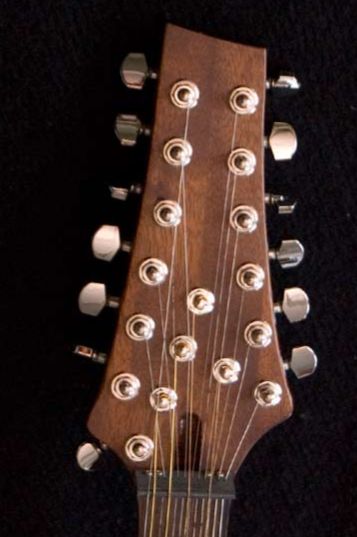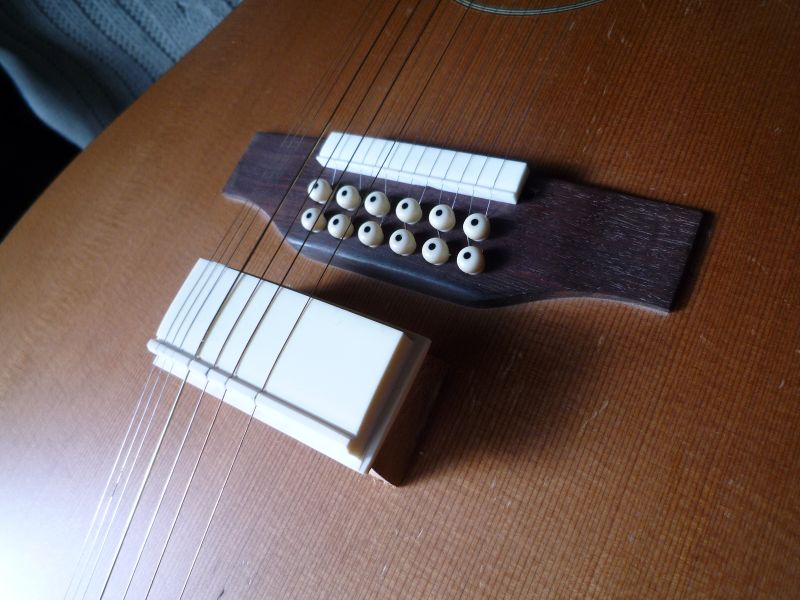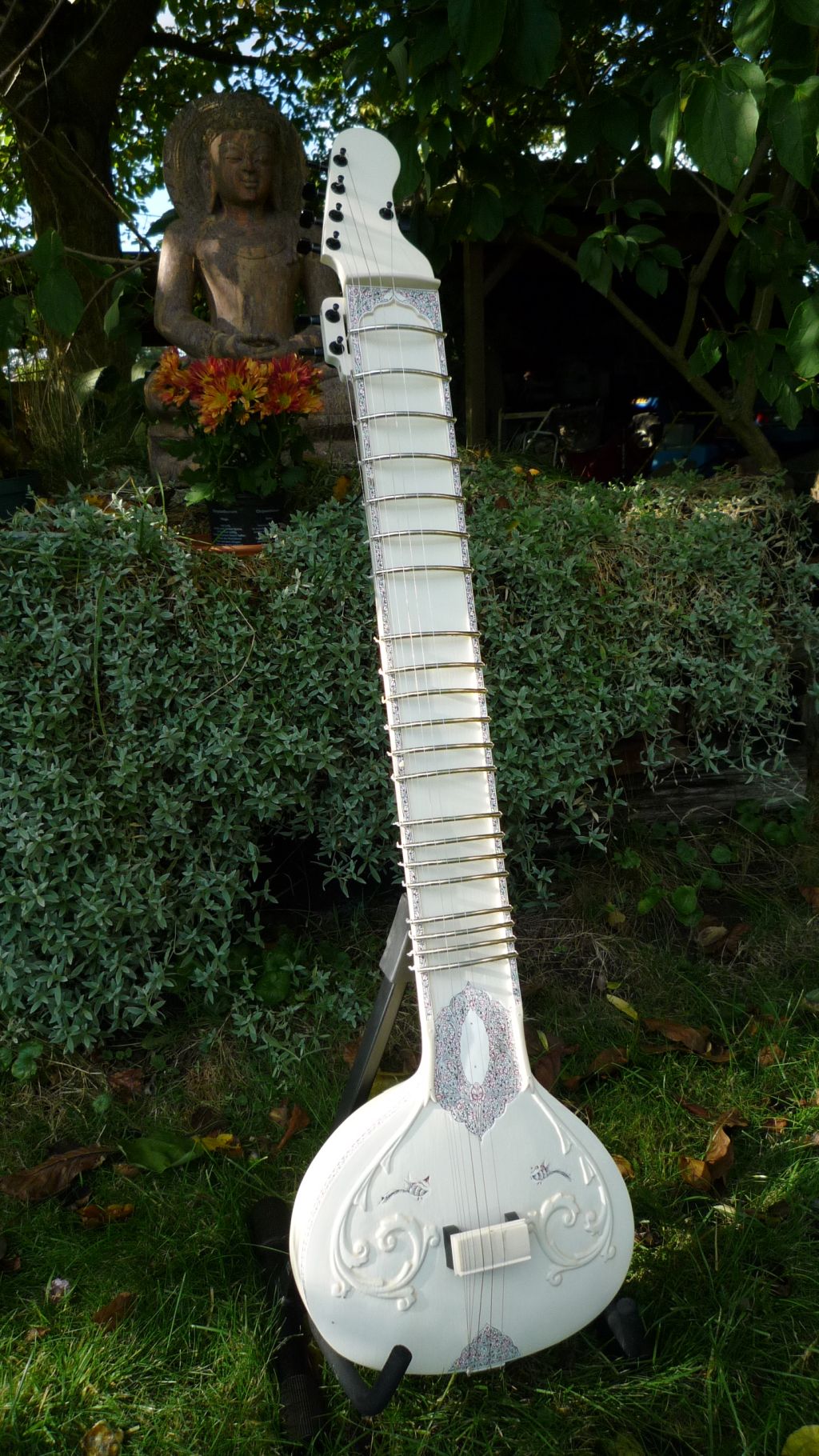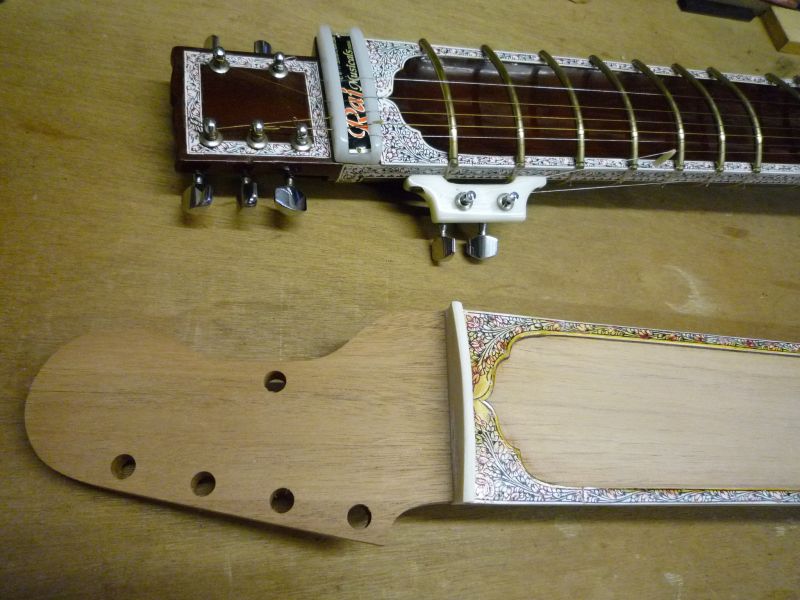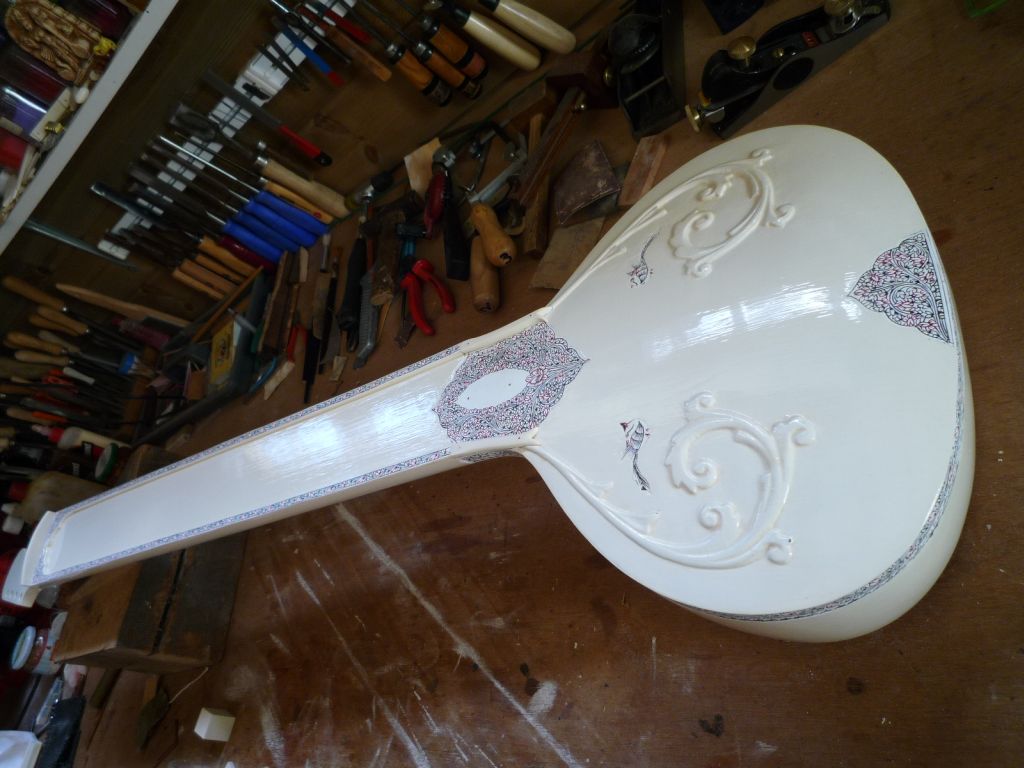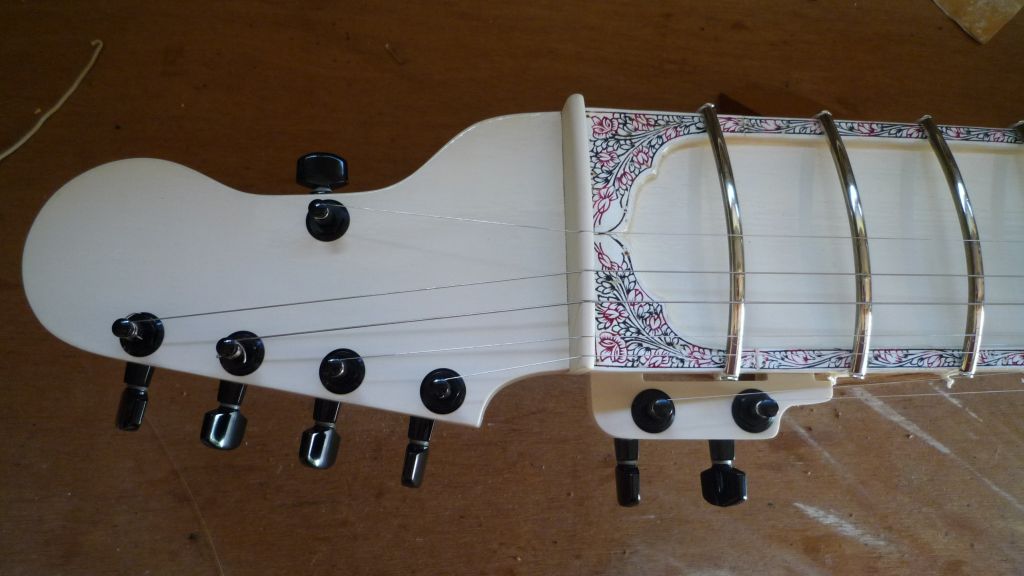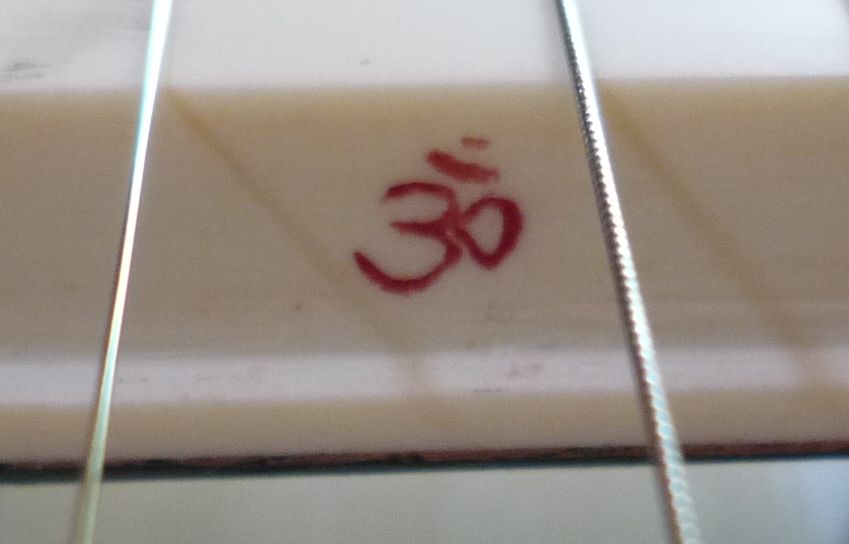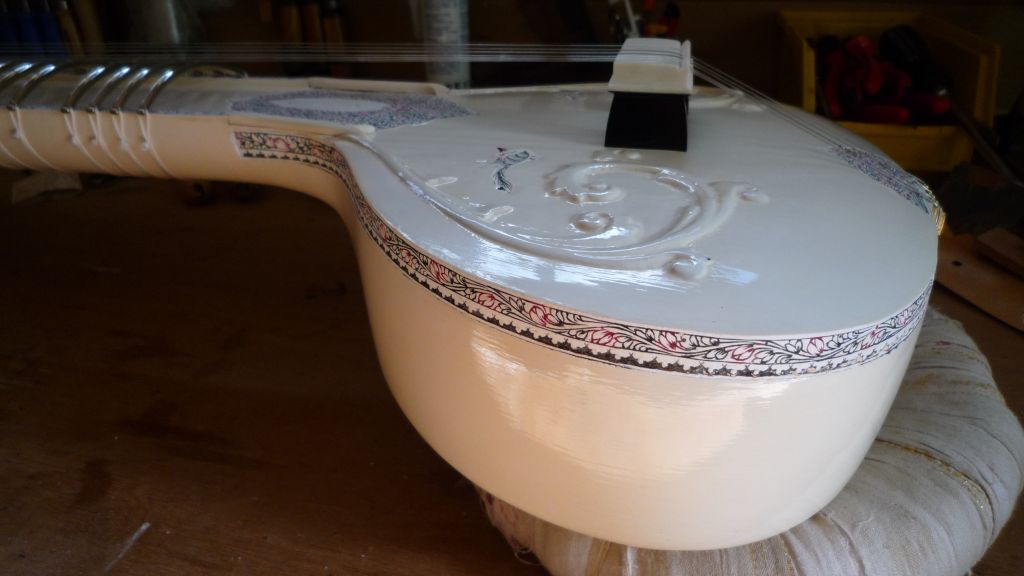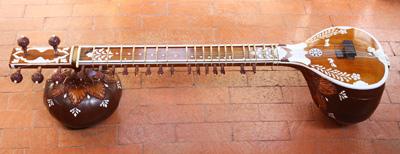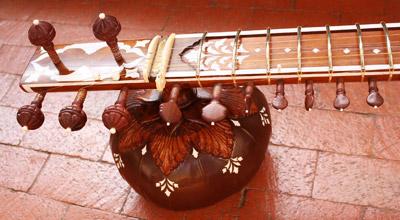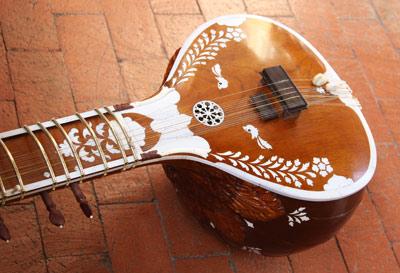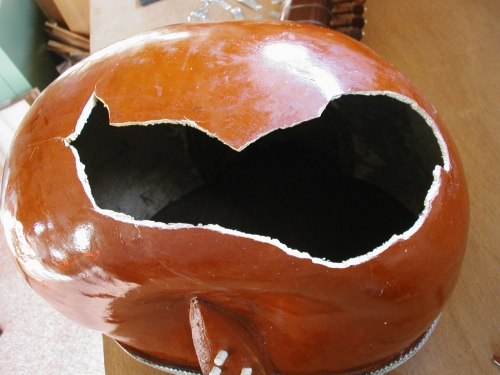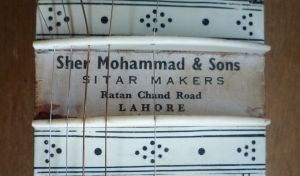
This sitar was made in the “Sher Mohammad & Sons Sitar Makers”- shop in Bansanwala Bazaar, Lahore 1940 – 1950 by early sitarmaker Sher Mohammed. At that time, before the Partition, he taught sitar making to, amongst others, Rikhi Ram Sharma and Kartar Chand Sharma. At Partition time, both Rikhi Ram Sharma and Kartar Chand Sharma left Lahore and headed for Delhi where they both settled their own sitar shop (only 800 m. away from each other). Rikhi Ram’s shop became world famous due to Ravi Shankar and the Beatles. Kartar Chand, joined by his younger brother Hari Chand, remained low profile and continued making high quality professional sitars at Paharganj. They developed their own style of sitars and got specialised in repair work. Amongst their main customers was late Pt. Balaram Pathak, and his son Ashok Pathak. In januari 1993 Kartar Chand passed away, and thus leaving the shop to his brother Hari Chand.
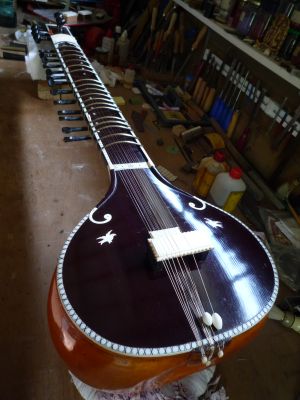
The original stringing (before main artists commenced to change details as per their own requirements) put on this sitar is:
Main strings gauges :
1) Baj tar : steel, 0,28mm (N°2) or 0,30mm (N°3)
2) & 3) Jora tar : brass, 0,37mm (N°28) or 0,40mm (N°27)
4) Pancham tar : brass, 0,37mm (N°28) or 0,40mm (N°27)
5) Pancham tar : steel, 0,28mm (N°2) or 0,30mm (N°3)
6) & 7) Cikari tar : steel, 0,21mm (N°00) or 0,23mm (N°0)
Taravs : steel, 0,21mm (N°00) or 0,23mm (N°0)
REMARK: Depending on style and/or raga the 4th string should change.
In the rare situation you are using a DHA/NI (= A#/B#) then the original string gauge can be used. However, in a more appropriate tuning, when the string’s pitch is raised to GA (= E#) this brass string tends to break easily. So, nowadays, a steel string, 0,28mm (N°2) or 0,30mm (N°3) is used more commonly.
Also, in my personal experience with Hari Chand, since long time the brass strings (#2-3-4) aren’t used any more. They are replaced by bronze, which alloy is much stronger and has a warmer sound.
Practical tuning of the 7 main strings is:
1) tuned to MA (F#) : steel, 0,28mm (N°2) or 0,30mm (N°3)
2) & 3) tuned to SA (C#) : bronze, 0,37mm (N°28) or 0,40mm (N°27)
4) tuned to GA (E#) : steel, 0,28mm (N°2) or 0,30mm (N°3)
5) tuned to PA (G#) : steel, 0,28mm (N°2) or 0,30mm (N°3)
6) & 7) tuned to SA (C#) : steel, 0,21mm (N°00) or 0,23mm (N°01)
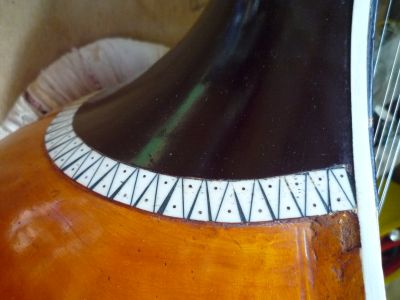 This sitar has very simple decoration, old style round kutis and a beautiful tumba. Also note that the cikari kutis are not different from the tarav kutis. The shape of the neck is rather rectangular and this tiny instrument is ultra lightweight… Very special on this sitar is that the tabli is made of spruce wood. The sound of this sitar is particularly clear, warm and with a strong tarav response.
This sitar has very simple decoration, old style round kutis and a beautiful tumba. Also note that the cikari kutis are not different from the tarav kutis. The shape of the neck is rather rectangular and this tiny instrument is ultra lightweight… Very special on this sitar is that the tabli is made of spruce wood. The sound of this sitar is particularly clear, warm and with a strong tarav response.
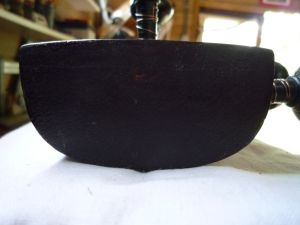
See this article about musical heritage: “The last of the sitar makers” by Sonia Malik, published in The Express Tribune, 24/09/2011.
Read the full Kartar Chand Hari Chand history here.
 Harry Shaffer, a creative sitar maker living in Asheville, North Carolina, USA, has been developing an all carbon fiber acoustic sitar over the past couple of years. He began designing plywood guitars as a child and discovered his fascination with the sitar and the music of India in 1993. Because of his frustrating experiences with his first no-name sitar, he put his lutherie skills to work and began ripping sitars apart in order to figure out how to make them work better. In 2013 he founded Carbon Sitars and he actually begun taking orders for custom made carbon fiber acoustic sitars.
Harry Shaffer, a creative sitar maker living in Asheville, North Carolina, USA, has been developing an all carbon fiber acoustic sitar over the past couple of years. He began designing plywood guitars as a child and discovered his fascination with the sitar and the music of India in 1993. Because of his frustrating experiences with his first no-name sitar, he put his lutherie skills to work and began ripping sitars apart in order to figure out how to make them work better. In 2013 he founded Carbon Sitars and he actually begun taking orders for custom made carbon fiber acoustic sitars. This extraordinary version called “The Suibokuga Sitar” was inspired by the art of Japan, in particularly, the sumi-e, or ink wash painting. The main pegs lack the traditional sitar designs, opting for a more Japanese design.
This extraordinary version called “The Suibokuga Sitar” was inspired by the art of Japan, in particularly, the sumi-e, or ink wash painting. The main pegs lack the traditional sitar designs, opting for a more Japanese design. Here is a concept drawing of the main bridge. Harry Shaffer wanted something that reflected the aesthetic of Japanese architecture, so he chose a design that invokes a “torii” or gate to a Shinto shrine.
Here is a concept drawing of the main bridge. Harry Shaffer wanted something that reflected the aesthetic of Japanese architecture, so he chose a design that invokes a “torii” or gate to a Shinto shrine.
